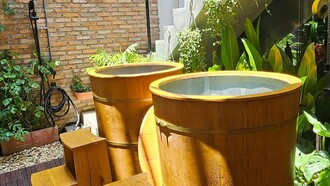A week ago, if you’d asked Marah why discovering her “essence” was important, she probably would’ve looked at you like you had two heads. Just a week later, everything had shifted. Now, she believes it’s one of the most important things anyone can do.
Last Tuesday, I took my best friend Marah to my granddad’s cabin for a personal retreat. We spent the morning reflecting on every milestone we’d reached in 2024 and brainstorming the life we want to build in the upcoming year. These are my favourite kinds of days—days spent exploring life’s big questions as an existentialist.
I had planned an exercise to help us think deeply about where we want to focus our energy in the New Year. And, if I’m being honest, it worked differently—and far better—than I ever expected. Rather than just helping us choose a focus, it actually revealed the core of who we are, both as friends and as individuals. During an hour-long conversation, I nudged us to dig into our psyches, our emotional well-being, our dreams, and our fears. We sketched out visions and goals that felt incredibly cathartic. But before we could dive into the nitty-gritty, I gave Marah a bit of a challenge: she needed to find her essence.
“What does that even mean, and how does someone go about finding it?” were Marah’s first questions.
Your “essence” is the true you—the core of who you are. It’s the one thing people look to you for, the unique quality you bring to the world. It’s the part of you that, in a way, is your superpower.
“Come on,” she replied, rolling her eyes. “I don’t need to figure that out. I’m not an existentialist like you, or someone training to be an ontological life coach. I’m fine with the connection I already have with my pretty amazing body. Isn’t that enough?”
I smiled. It’s easy to deny the need for self-discovery. But every moment we spend avoiding our true nature, we’re actually doing ourselves—and the people we care about—a disservice.
“Existentialists are probably turning over in their graves right now,” she muttered with a grin.
“Or maybe they’re just hanging out somewhere, thrilled that we’re finally asking these questions,” I replied. “Besides, remember what Kierkegaard said: ‘The deepest despair is choosing to be someone else rather than yourself.’”
“Who the hell is that?” she shot back, laughing.
After a pause, Marah grew thoughtful. “Do you think finding your essence might lead to solitude? Or something mystical? I’m not sure I’m cut out for this.”
“Sometimes, yes. Finding your essence can mean carving out space for yourself—solitude, silence, meditation. It can involve confronting yourself without the noise of social demands. But it’s not always a journey you have to do alone. It’s personal, yes, but not necessarily solitary forever. Being true to yourself means embracing your essence, connecting with others genuinely, and finding harmony with the world around you.”
I paused, seeing her curiosity spark. “And when you’re living in tune with that essence, every action feels purposeful. You’ll wake up with passion, ready to take on the day.”
I won’t say I was completely shocked by what we both identified as our essence, because it is what we do every day (although we’ve never really articulated it). However, I was a little amazed to learn that it is different than I thought it was.
If you had asked me who I was before my divorce three years ago, I would’ve said that I was a corporate lawyer in California. I would’ve said that I was pursuing my career goals and being a great wife and mother of two.
If you pressed more, I would’ve told you that I believed in truth, justice, and doing what was right in the world. I would’ve said that I helped balance the scales of justice in my life. Today, I have a very different answer—just like my friend Marah. I was once like you, caught up in many labels that I let define me. We adopt so many roles in life, but how many of them truly reflect who we are?"
You and I are both products of our environments, our professions, our parents, our families, our friends, and our classmates. These labels, these representations, these appearances—ultimately define us. We are our personalities. We are our pasts. We are the stories we’ve been telling ourselves. We are our egos.
If I were to ask, “Who are you?” you’d probably tell me, “Knock it off Margie, I’m not stoned right now and can’t answer questions that have no relevance to my life. I need to respond to a dozen emails and get home to finish the third season of Gossip Girl.”
But when do you actually stop and ask yourself, "Who am I?" I'm not talking about your nationality, career, or where you live—this goes deeper than labels. This is about getting to the heart of who you truly are.
If you’re not asking yourself, "Who am I?" or taking time to reflect on your true self, then you’re probably not tapping into your core—your essence. Without moments of solitude, you may be living a life that’s more influenced by external forces than your own desires. It’s all too easy to get swept up in the noise of the world around us. Every day, we’re bombarded with messages from all sides—parents telling us what to do, friends offering advice, colleagues sharing their opinions, and society at large—through TV, social media, and random encounters—constantly shaping our views and choices.
With so many external influences flooding our minds, we end up living lives that aren't entirely our own. We begin to mirror what others do. We adopt their dreams, move where they move, take on careers because others are doing the same, eat at restaurants they recommend. We become echoes of everyone else. If you're feeling ready to stop living unconsciously and want to reconnect with your essence—your truth—this post is for you.
Who are you, really?
When you dig deeper, you’ll realise that your sense of self isn't based solely on labels and beliefs. You are not your name, your race, or your citizenship. You are not your job title or the things you own. These are just labels society has attached to you, ways you show up in the world.
The first step in discovering your essence is becoming aware of the labels you've adopted over time. Perhaps you’ve been carrying them for so long, it’s hard to separate them from who you truly are. You may have lived with your name for years, but is that name truly who you are? You are so much more than a label or a set of societal roles.
Breaking free from external identifications
These labels—whether they’re related to your career, your ethnicity, or your social role—are not your essence. They serve as tools for navigating life, but they don’t define who you are at your core. Imagine these labels as clothes you wear: they help you navigate your world, but you can always change them. You are not bound to them.
The key to finding yourself is understanding that your beliefs, values, and life experiences don't define you. They’re simply pieces of the puzzle, temporary garments you put on for a time. Recognizing this allows you to peel back the layers and rediscover your true self.
The real you is beneath it all
Who are you beneath the labels, beliefs, and external influences? When you start stripping away these layers, you’ll uncover your essence—your soul. It’s the part of you that exists beyond thoughts, beliefs, fears, and societal expectations. The essence within you is pure and timeless.
To access it, you must learn to step back from everything you’ve been taught to believe about yourself. Become aware of the constant inner dialogue—the “inner roommate” as Michael Singer calls it. This inner voice is constantly commenting on your life, forming opinions, and reacting to your experiences. But this voice isn’t who you are. You are the observer of that voice, the one who can hear it but doesn't need to identify with it.
The journey of self-discovery
Self-discovery is like peeling an onion. First, you notice the labels you use to describe yourself. Then you realise that these labels are not you; they’re simply aspects of your existence. As you go deeper, you uncover the beliefs and values you’ve carried with you. Eventually, you see that they, too, are just layers of an identity you’ve built.
When you realise that these beliefs and labels don’t define you, you can release your attachment to them. You begin to recognise your true essence beneath the surface, free of conditioning, beliefs, and external expectations.
Living from your true essence
Once you’ve shed the labels and the false identities, what remains is the real you. This is the part of you that radiates with truth and authenticity. When you live from this place, you become aligned with your soul, acting from a deep well of inner wisdom.
For me, this journey has shifted how I view myself and my purpose in life. I no longer define myself by my profession or the work I do. Instead, I see myself as a soulful being, trying to fully express my essence. I use this journey to guide others, helping them reconnect.














